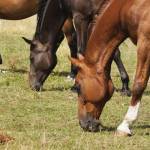Survey on Seasonal Pasture Myopathy in Horses

A syndrome known as seasonal pasture myopathy (SPM) may be more widespread than statistics presently show. The syndrome is most commonly seen in the fall when pasture-kept horses develop heavy sweating, muscle twitching, weakness, and reluctance to move. As the condition progresses, horses develop difficulty in breathing and may pass dark-colored urine. In about 90% of cases, the affected horse collapses, is unable to get up, and dies within three days of the disease onset.
A similar condition, equine atypical myopathy, has been reported in Europe since the 1980s, and it is possible that the two conditions are actually the same. No cause has been found for either syndrome, though some cases seem to be associated with certain weather conditions and horses that are pastured at least six hours a day.
Stephanie Valberg, Ph.D., D.V.M., is leading a study of SPM and has asked for help from owners of horses that may have had this syndrome. Valberg, a leading equine researcher at Michigan State University, is credited with uncovering the causes and treatments for numerous muscle disorders in horses. The current study will work with horse owners to identify at-risk horses and develop diagnostic tests for SPM.
Owners of horses that possibly had, or died from, SPM are asked to take a risk assessment survey that can be found at www.cvm.umn.edu/umec/SPM. Information about the disease is also available on the site. For questions about SPM, please e-mail nmdl@umn.edu or call 612-624-3611 and leave a message.








